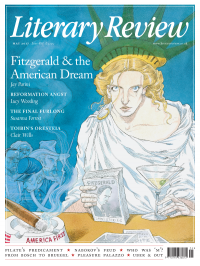Minoo Dinshaw
Vinyl Frontier
The Forensic Records Society
By Magnus Mills
Bloomsbury 182pp £18.99
The Forensic Records Society stands out among Magnus Mills’s novels for its practically Aristotelian narrowness. Its dialogue-driven plot assembles in the back room of a pub (not, at that, a gastro). Reflective, preparatory interludes are sketched at the slightly depressing abodes of the novel’s two leading vinyl bores. Neither quite qualifies for the title of protagonist.
The classically Millsian narrator, nameless as ever, is conscience-ridden yet malleable. Little escapes him but he seems paralysed without orders; at one point he comments with discernment, ‘I’m a bit of an outsider these days.’ His stronger, dubious friend James is described as ‘puritanical’ and a ‘true believer’. After founding the titular records society, he provokes a series of diplomatic ruptures and dispatches the narrator to take the flak. James, with his ‘side-projects’ of relentlessly categorical tedium, iron will, inexplicable charisma to the novel’s personnel and inevitable comeuppance, would be a memorable monster if he appeared in a novel whose purpose approached conventional characterisation.
James and his ‘forensics’ are, in keeping with their guru’s mantra, wedded to listening pure and simple, ‘without comment or judgement’. These and the founder’s adherence to the letter of other rules – notably over timekeeping, though time stubbornly refuses to be kept, and is generally in short supply –

Sign Up to our newsletter
Receive free articles, highlights from the archive, news, details of prizes, and much more.@Lit_Review
Follow Literary Review on Twitter
Twitter Feed
Under its longest-serving editor, Graydon Carter, Vanity Fair was that rare thing – a New York society magazine that published serious journalism.
@PeterPeteryork looks at what Carter got right.
Peter York - Deluxe Editions
Peter York: Deluxe Editions - When the Going Was Good: An Editor’s Adventures During the Last Golden Age of Magazines by Graydon Carter
literaryreview.co.uk
Henry James returned to America in 1904 with three objectives: to see his brother William, to deliver a series of lectures on Balzac, and to gather material for a pair of books about modern America.
Peter Rose follows James out west.
Peter Rose - The Restless Analyst
Peter Rose: The Restless Analyst - Henry James Comes Home: Rediscovering America in the Gilded Age by Peter Brooks...
literaryreview.co.uk
Vladimir Putin served his apprenticeship in the KGB toward the end of the Cold War, a period during which Western societies were infiltrated by so-called 'illegals'.
Piers Brendon examines how the culture of Soviet spycraft shaped his thinking.
Piers Brendon - Tinker, Tailor, Sleeper, Troll
Piers Brendon: Tinker, Tailor, Sleeper, Troll - The Illegals: Russia’s Most Audacious Spies and the Plot to Infiltrate the West by Shaun Walker
literaryreview.co.uk